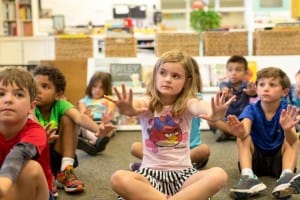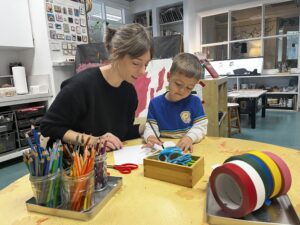At The College School, we draw on many different educational sources to bring our students the best possible learning experience. It’s not hard to see that our teachers and students benefit from the educational beliefs and practices of Jean Piaget (Constructivist Education), John Dewey (Progressive Education), Theodore Sizer (Coalition of Essential Schools), Howard Gardner (Multiple Intelligences), and Loris Malaguzzi (Reggio Emilia).
Student involvement and immersion in the curriculum promotes a deep understanding of subjects and ignites a life-long passion for learning. There are many dimensions to our teaching philosophy that makes it so successful, but a few key components of our approach to experiential and constructivist education are highlighted here:
Click on the icons below to learn more about each core value of The College School
 Walk into any classroom and you’ll see hands raised, small groups assembled, presentations underway. You’ll find teachers creating collaborative partnerships with students, encouraging them to discover and connect. You’ll observe children engaged in meaningful hands-on projects that build skills and excite creativity.
Walk into any classroom and you’ll see hands raised, small groups assembled, presentations underway. You’ll find teachers creating collaborative partnerships with students, encouraging them to discover and connect. You’ll observe children engaged in meaningful hands-on projects that build skills and excite creativity.
You’ll also see classrooms that are without children because the class has taken their learning into the field. Our teaching philosophy is that learning happens everywhere: in our classrooms, in the city, in the wilderness, on a walk around the neighborhood, or at the local farmers’ market. As testimony to our experiential education, our three school buses log an average of 10,000 miles a year.
Read our latest TCS Newsletter to learn more about how we are living our mission.


